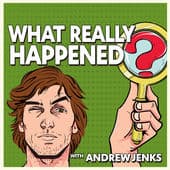From documentaries to podcasts, Andrew Jenks challenges himself with What Really Happened?

“This is Jenks.”

Speaking with documentarian turned podcaster, Andrew Jenks, his voice is more relaxed and casual but those are the only discernible differences. He doesn’t have a separate “radio voice” and “normal voice” like others I’ve met.
Jenks, a documentary wunderkind, had already achieved critical acclaim for numerous projects and founding a youth-focused film festival before celebrating his 25th birthday. He’s done documentaries for HBO, ESPN, CNN, and MTV. Being so accomplished at such a young age, taking a risk by diving headfirst into podcasts seems to be the next conquest. Partnering with Cadence13 and Seven Bucks Productions, he created What Really Happened?, an audio documentary challenging some preconceived notions of historical events.
For Jenks, podcasts presented a new endeavor, equal parts exciting and challenging. As a documentarian, he has a familiar bag of tricks, but suddenly removing the visual component forced him to rethink his storytelling strategy, a process he referred to as “grueling.” The excitement though was just as alluring. Along with creative control, free from executive and studio notes, he was liberated from the time constraints TV typically binds you with.
In podcasting it’s much more of telling the best story you can. If it’s three hours or ten minutes, tell me the best fucking story you can. In that sense it’s the most raw form of storytelling and it’s awesome.
This blunt observation and direct speaking style is apparent throughout the podcast. Where other audio dramas and new true crime podcasts focus on the storytelling element — usually at the expense of truth and authenticity — What Really Happened? is rooted in fact-based evidence. In the few times Jenks does speculate, he clearly labels it as such.
Below is the full Q&A between Andrew Jenks and I, lightly edited for clarity and brevity.
****
Kevin: As an experienced documentary filmmaker, what originally drew you into podcasts and starting What Really Happened?
Andrew Jenks: I had been into this event from 1981 where apparently Muhammad Ali had talked this guy out of committing suicide in Los Angeles. I always had seen it as a short documentary film and was talking to Brian Gewirtz, Dany Garcia, and Dwayne Johnson about it. They started to think bigger, “well, are there other examples in history of events like this?”
I came up with a list of other examples and it slowly developed. After speaking with more people, we realized it was a good idea to go in a looser route where we could go a few directions in each episode. We decided to start it out as a podcast, which was the best idea. I knew very little about podcasts, but with a little push, it was a no-brainer. I’m very happy with that decision.
Kevin: A lot of audio documentaries — especially true crime — embellish the facts to make a better story. Yours, however, are so rooted in facts. Have you noticed this trend, and do you see the danger of straying away from facts to fit the story they would prefer to tell?
Andrew Jenks: My first look into true crime was a documentary called dream/killer about Ryan Ferguson, who was wrongfully incarcerated for murder. I followed his story for about about 2 years behind bars. While we were making the movie he was released, so we had to change the narrative. It was no longer going to be my attempt at a Thin Blue Line documentary, which was either an ambitious or maybe slightly arrogant plan, but instead about how this can literally happen to anyone. All it takes is two strangers to say you did it. He got out on his own because he had an unbelievable lawyer and his dad had gone on this nine-year odyssey of proving his innocence. The movie eventually became more about his dad.
It was during this time I saw a lot of true crime out there that were disrespectful to the victims. The creators made it more about putting entertainment first opposed to being sensitive to the people involved in these horrific crimes. I am not saying I have perfected that balance but what we did with dream/killer was walk the fine line of making a movie for entertainment, but also ensuring it was respectful. It was during that process I became more aware of wrongful incarceration as well.
After dream/killer, Ryan and I created the MTV show ‘Unlocking the Truth’ that helped move the needle in getting Calvin Michael Smith out of prison. It was during this time I realized through Ryan — and I give him all of the credit — the importance of facts. I have been making documentaries for about 12 years now. It’s very easy to manipulate things in documentaries. You shoot 200 hours of footage but you’re only going to put together 90 or so minutes. The question is, are you going to manipulate it so that it’s objective, or are you going to manipulate it so that it’s a Michael Moore piece in which you know he probably isn’t going to change how he perceives an issue during the process. Both are fine forms of artistic expression, but Ryan’s really the one that rammed into my head facts, facts, facts.
When working on this podcast I thought: if the title of the show is going to be What Really Happened? we can go down different rabbit holes or even look into conspiracy theories, but we need to always come back to facts.
Kevin: Talking about What Really Happened? and your switch to podcasts, how have you changed your techniques or your narrative approach to accommodate losing the visual element?
Andrew Jenks: As a storyteller it’s wildly different and much crazier. I could never have imagined losing at least 50% of the devices I’m used to. What this required was being much more creative in going about telling the story.
I forget who said this, but I’m reminded of the quote: “If I had more time, I would have written a shorter letter.”
Losing the visuals makes it a much more grueling process, which is the opposite of what a lot of people think. They assume with a podcast you hang out in the studio and shoot the shit. Something I learned from Paul Reid, the Churchill biographer, who got it from William Manchester, the guy who wrote the first two installments of the Churchill books, “The Last Lion” — they call it the “campfire test.” Can you tell the accurate portrayal of a person in a gripping way as if you’re sitting at a campfire with your friends? That’s always been the test.
What I’ve loved about the podcast experience, particularly versus television, is you don’t have to be as precious with every minute. In TV, you need to cut some parts to get the act out before commercials or to fit within a certain time frame. In TV, 30 minutes is actually 22 minutes 40 seconds after commercials; an hour show is 44 minutes and 20 seconds.
With podcasts, I can veer off in other directions. I can take all of the facts, all of the interviews, all of the things that I’ve read, and spend a couple of minutes having a little bit of a lighter moment, for example, imagining how the Chris Christie order would have gone down. You’re not given that freedom in TV. Some people like Donald Glover with Atlanta are pulling it off miraculously which is awesome. It’s hard to do in television, so podcasting in that sense is a total breath of fresh air.
In podcasting it’s much more of telling the best story you can. If it’s three hours or ten minutes, tell me the best fucking story you can. In that sense it’s the most raw form of storytelling and it’s awesome.
Kevin: The Daniel Green trial is semi-linked to the Michael Jordan episode earlier in the season, but it felt separate from the other episodes, and could have likely been a stand-alone full-length documentary. Is there a reason you chose to stick with the podcast route versus going a different way with this?
Andrew Jenks: That’s definitely not out of the question to do a full documentary. My thinking was though Michael Jordan is the entry point into the story, this is a story about Daniel Green.
I didn’t want to wait on it because I didn’t understand — and still don’t understand — why Daniel hadn’t been interviewed in eight years. I had been warned everyone was afraid to touch it. There’s overwhelming tangible evidence suggesting his innocence. This guy’s been wrongfully incarcerated for over two decades now, and there just isn’t time to wait.
The objective in this case is to help get this guy out. There is no DNA evidence, there is no physical evidence, and the only witness is the guy who actually did it. I’d ask anyone to listen to that episode to hear the full story, “The Trial of Daniel Green”. He hasn’t even been given a retrial yet, which is a calamity That is against everything the system stands for.
I wouldn’t be able to look myself in the mirror if I waited any longer to tell his story.
Kevin: It’s evident when listening to any episode that a tremendous amount of time and research goes into the production. What’s something an everyday listener doesn’t know about the process or what ends up on the cutting room floor?
Andrew Jenks: I can’t say enough good things about Cadence13 and Seven Bucks Productions. They haven’t given me notes, which in the TV world would be crazy. The six episodes, for instance, were six ideas that I had and they trusted me and gave me the freedom to make them. You’re given this freedom to tell your story, but with that freedom there’s no research team.
There’s no research team because I have to be the one doing the research, otherwise it’s a different podcast. I think people who haven’t listened to it are oftentimes surprised by when I tell them it’s a hardcore full-time job. It’s special for me because I get to learn so much.
Kevin: How do you find the stories you want to dive into?
Andrew Jenks: The Ali one started with a tweet I saw that looked too good to be true. The more I looked into it the more suspicious things looked. With Chris Christie, I always wanted to know exactly what was Bridgegate. Also, as the trial concluded it was the same time when Trump was being elected, so the end results weren’t being as covered by the national media. I wanted to sort out exactly what happened. With Britney Spears, I always knew of the concept of a meltdown she had 10 years ago but didn’t know everything. When looking into it I realized there’s so many layers to this.
With Princess Diana, I saw all these specials coming out the 25th anniversary of her passing, and I’m at that age where I didn’t totally understand what happened when it happened. As the process went along I made it more about how the media covered it because the conspiracies out there are unfounded and ridiculous. It’s an unfortunate case of a lot of men taking advantage of her. Her not putting a seatbelt on, a drunk driver, and crazy paparazzi certainly not helping the case. It’s starting off with the simple question: what happened in this case?
Kevin: When you do have time, are there specific podcasts that you do listen to?
Andrew Jenks: If someone out there can get me on to Joe Rogan, I find him fascinating. I’ll actually listen to random podcasts if I’m looking for information on a particular topic.
I haven’t had time to explore too much. I listen to Gladwell’s podcast (Revisionist History) seeing as there’s some similarities. I listen to James Andrew Miller’s podcast (Origins). I’m a hardcore Curb fan, and then also I’ve done two 30 For 30s, so I was interested in both of his seasons. I like Longform podcast. I love Chris Gerhard’s Beautiful Anonymous! Oh, West Wing Weekly, I’m a hardcore West Wing fan.













Comments
Comments are closed.